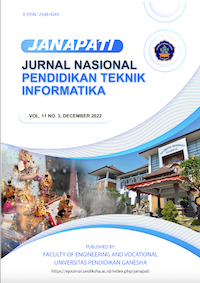Perancangan Fitur Learning Management System (LMS) untuk Penanaman Nilai Berbasis Cognitive Moral Development
DOI:
https://doi.org/10.23887/janapati.v11i3.54106Keywords:
LMS, Cognitive Moral Development, FiturAbstract
Penanaman nilai dalam pembelajaran online menjadi peluang pencapaian aspek sikap dan tata nilai dalam kurikulum Outcome Based Education (OBE). Studi ini bertujuan untuk mengetahui penerapan cognitive moral development terhadap learning management system (LMS) di perguruan tinggi. Konsep penilaian appraisal 360% digunakan untuk membagi peran penilai kepada teman sejawat, mahasiswa, dosen pengampu dan penilai luar. Tujuan utama dari perancangan fitur ini adalah mengembangkan fitur LMS dari yang telah berjalan dengan menambahkan fitur baru berupa media diskusi group kelas, membaca komentar, memberi tanggapan komentar, dan memberikan penilaian. Hal ini merupakan terobosan baru dalam menggali, mengembangkan dan mengedukasi sikap perilaku mahasiswa. Dari sisi akses dosen, LMS online dirancang untuk mendukung peran dosen dalam melakukan penilaian sikap dan perilaku mahasiswa. Metode pengembangan sistem menggunakan model prototype sedangkan metode penelitian kualitatif digunakan untuk menguji validitas dan efektivitas LMS terhadap tiga dosen dan sembilan mahasiswa sebagai representasi keterwakilan kelas yang memiliki karakter respons berbeda beda terhadap instrumen. Peneliti bertindak sebagai kolaborator bagi dosen pengampu mata kuliah yang terlibat dalam setiap tahapan perancangan fitur penanaman nilai dan perilaku serta pemberian nilai rating hingga pengujian kualitatif. Instrumen untuk menggali sikap dan perilaku dikembangkan berbasis kasus yang mengandung dilemma dalam bentuk teks narasi, video maupun audio. Implikasi dari LMS penanaman nilai afektif ini adalah kesiapan dosen menyajikan kualitas instrumen/ rubrik yang seharusnya disesuaikan dengan indicator atau capaian pembelajaran serta materi pembelajaran. Studi ini memiliki keterbatasan pada aspek pengujian. studi selanjutnya dapat dikembangkan pada pengujian besar atau kuantitatif.
References
R. Yusri, M. Muspardi, E. Kemal, and W. Rahmat, “Effectiveness of national qualification framework Indonesia based curriculum and higher education national standard behaviour assesment rubric,” J. Phys. Conf. Ser., vol. 1157, no. 4, 2019, doi: 10.1088/1742-6596/1157/4/042129.
S. Sumarsono Sumarsono Sutrisno and A. Fatwanto, “Feasibility study of Massive Open Online Course (MOOC) in supporting self determined learning in state islamic higher education,” Compiler, vol. 10, no. 2, pp. 109–116, 2021.
E. D. Chairunisa, “Penilaian Portofolio dalam Meningkatkan Kemampuan Self-Assessment Mahasiswa,” Kalpataru J. Sej. dan Pembelajaran Sej., vol. 4, no. 1, pp. 83–88, 2018.
M. E. Cottam, “An Agile Approach to LMS Migration,” J. Online Learn. Res. Pract., vol. 8, no. 1, p. 26967, 2021.
M. Mabed and T. Köhler, “The impact of learning management system usage on cognitive and affective performance,” in GeNeMe, 2012, pp. 273–284.
M. Garcia, J. Quiroga, and F. Ortin, “An infrastructure to deliver synchronous remote programming labs,” IEEE Trans. Learn. Technol., vol. 14, no. 2, pp. 161–172, 2021.
Sutrisno and Suyadi, Desain Kurikulum Perguruan Tinggi Mengacu Kerangka Kualifikasi Nasional Indonesia. Bandung: PT. Remaja Rosdakarya, 2016.
L. Kohlberg, The Philosophy of Moral Development Moral Stages and the Idea of Justice /Lawrence Kohlberg. --. --. Harper & Row, C1981, 1981.
R. A. Berk, “Using the 360 degrees multisource feedback model to evaluate teaching and professionalism.,” Med. Teach., vol. 31, no. 12, pp. 1073–1080, Dec. 2009, doi: 10.3109/01421590802572775.
R. S. Pressman, Software engineering: a practitioner’s approach. Palgrave macmillan, 2005.
L. Kohlberg and R. H. Hersh, “Moral development: A review of the theory,” Theory Pract., vol. 16, no. 2, pp. 53–59, Apr. 1977, doi: 10.1080/00405847709542675.
B. Nkuyubwatsi, “The outcome of constructive alignment between open educational services and learners’ needs, employability and capabilities development: Heutagogy and transformative migration among underprivileged learners in Rwanda,” Cogent Educ., vol. 3, no. 1, pp. 1–12, 2016, doi: 10.1080/2331186X.2016.1198522.
J. B. G. Tilak, “Dilemmas in reforming higher education in India,” High. Educ. Futur., vol. 7, no. 1, pp. 54–66, 2020.
L. Kohlberg, “Stages of moral development,” Moral Educ., vol. 1, no. 51, pp. 23–92, 1971.
Downloads
Published
How to Cite
Issue
Section
License
Copyright (c) 2022 Sumarsono Sumarsono

This work is licensed under a Creative Commons Attribution-ShareAlike 4.0 International License.
Authors who publish with Janapati agree to the following terms:- Authors retain copyright and grant the journal the right of first publication with the work simultaneously licensed under a Creative Commons Attribution License (CC BY-SA 4.0) that allows others to share the work with an acknowledgment of the work's authorship and initial publication in this journal
- Authors are able to enter into separate, additional contractual arrangements for the non-exclusive distribution of the journal's published version of the work (e.g., post it to an institutional repository or publish it in a book), with an acknowledgment of its initial publication in this journal.
- Authors are permitted and encouraged to post their work online (e.g., in institutional repositories or on their website) prior to and during the submission process, as it can lead to productive exchanges, as well as earlier and greater citation of published work. (See The Effect of Open Access)







